Shawn Levy Night at the Museum Interview
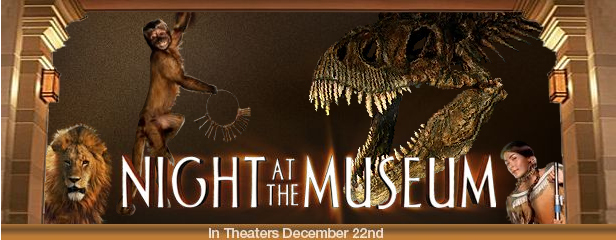
LEVYS NIGHT AT THE MUSEUM
by Paul Fischer in Los Angeles.Shawn Levy may well be one of the most in-demand comedy film directors in Hollywood, a reputation bound to be further accentuated when his special effects comedy Night at the Museum hits cinemas for Christmas. Not a likely choice for a huge special effects-laden film, yet Levy managed to pull it off. He talked to Paul Fishcer in this exclusive interview.
Paul Fischer: Now if you look at your career as a director and somebody was saying that they wanted to do a big special effects movie about things coming alive, I wouldnt imagine youd be on the top of anyones list, but Im wondering what you think they saw in you because I know that when you were doing a recent interview, you had great misgivings about taking this on, right?
Shawn Levy: Mm. Ill answer that in a few stages. Firstly, I dont think any studio that hadnt worked with me repeatedly would have given me this movie. I had done two movies for Fox, they were both successes and they know me. They know me as a filmmaker but maybe more importantly they know me as a person. They know my sense of humor, they know my aspirations, so they not only gave me a shot with this movie, when I turned it down they kept coming back. And Im grateful for that because, as you say, theres nothing on my filmography that screams event, tent-pole, effects, adventure guy. But I had it in me and they saw it and they took the leap of faith.
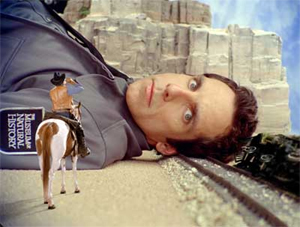 Paul Fischer: Is that because they didnt want just a special effects movie, that they wanted something which was both funny and touching and had a little bit.... maybe even a little bit to say?
Paul Fischer: Is that because they didnt want just a special effects movie, that they wanted something which was both funny and touching and had a little bit.... maybe even a little bit to say?Shawn Levy: Well I mean I actually think its an industry-wide trend. You look at starting with Peter Jackson off of, what, Heavenly Creatures going to Lord of the Rings. There was a certain awakening that took place there which had to do with the fact that filmmakers are storytellers and the stories they can tell are not defined by the stories theyve told - such that you now have seen.... you have Mark Waters doing Spiderwick Chronicles; you have Chris Weitz doing His Dark Materials, and you have me doing Night at the Museum. Were all comedy directors with heart, and no matter how big the scale of a picture if its neither funny nor poignant it wont work. Itll be fancy looking but utterly unaffecting to an audience.
Paul Fischer: So what did you do in developing the script that humanized it?
Shawn Levy: The moment where I decided to say yes to the movie was when a colleague of mine compared the movie to Finding Nemo, and it was like a switch was flicked - a father/son redemption story in the packaging of a big adventure. Literally once I saw that paradigm within Museum I knew I could do it because it gave me the appropriate balance, the appropriate priorities. However, I needed to make sure the script reflected that potential. So when I came on board, and even more intensely when Ben came on board, we made it a father/son story. We made it as funny as a comedy needs to be and we kept the visual wonder, but it wasnt foreground it was background, and it needed to be background for the stuff that really mattered to work. And the stuff that really mattered was the character, the relationships and the funny.
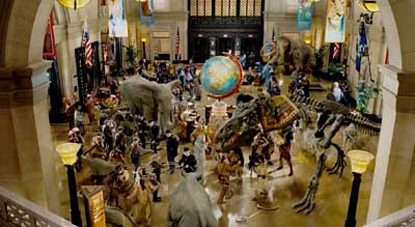 Paul Fischer: How daunting was it for you to deal with the special effects component of this?
Paul Fischer: How daunting was it for you to deal with the special effects component of this?Shawn Levy: The first month or so was really daunting. I had no idea what I was doing, but my fellow producer, Chris Columbus, gave me some good advice going in, having himself gone into Harry Potter knowing nothing about effects either. He said to me do the storyboards and be very specific about what you want. Let your team figure out how to get it. So I storyboarded more intensely and more thoroughly than I ever had. That said, within two weeks of shooting I had learned the language. It was like going to another country, and at first you have no idea what everyones saying but then you learn the language and you get it and you can communicate and you can understand whats going on around you. So, frankly, not to belittle the complexity of the process, but it is a learnable process, and I found that I learned it much quicker than I expected. That said, with Ben Stiller as my lead we took the cardinal rule of visual effects movies, which is storyboard, make a plan, execute the plan and we absolutely threw it out the window, because the way Ben works if you have a better idea on the day that youre shooting you go with that idea. If you suddenly want to put a woolly mammoth who takes his trunk and shoves you into a room where one did not exist it may give many a gray hair to the visual effects team standing in the corner freaking out, but if thats a better idea youve got to go with it. That happened almost every day, where we ended up throwing out a good portion of the storyboards and rolling with a new plan. But thats why I think the movie has the energy and humor that it does, because unlike many visual effects movies - and I wont name them - but a lot of them bore the hell out of me. Ben and I could give a shit whether there was a cool shot to be had of the Tyrannosaurus Rex from a certain angle. If, however, there was an engaging scene in which the T-Rex as a puppy dog wags its tail and smacks Ben in the chest sending him end over end into a marble staircase, thats interesting. Visuals alone meant nothing to us. Story, humor wrote the law - everything else had to get with the program.
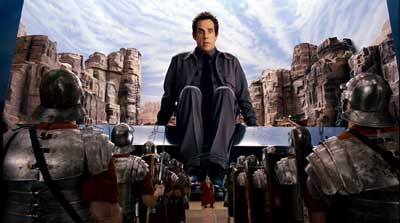 Paul Fischer: Now this is based on a book, right?
Paul Fischer: Now this is based on a book, right?Shawn Levy: Its based on a slight but charming childrens book complete with pictures, maybe 25 pages long, but the premise is in that book. The premise and credit for it goes to Milan Trenc who wrote the book ten years ago, 16.... excuse me, 1994 I believe. And it is about a night guard who gets a job at New Yorks Museum of Natural History and finds out that at night everything comes to life.
Paul Fischer: And that was more a starting point.
Shawn Levy: Chris Columbus company bought that book with Fox over a decade ago. It was developed and redeveloped. It went fallow as a project and it was then revived maybe three years ago. It was rewritten yet again. And thats when they started showing the scripts to me.
Paul Fischer: One of the things I liked about the film is that it also says a lot about the nature of history and the importance of history. Was that a theme that was kind of resonated do you think with you?
Shawn Levy: Lets put it this way, its interesting because my interest in history has to do more with thematics than events, such that Ill look at a period and see its... the ideas of the time more than I will focus on the events of the time. So I was fascinated in this movie in particular by the Teddy Roosevelt character and the core principles that he lived by, that he espoused, that he wrote about, and the way in which those thematics, those principles, could change my protagonist so that you have an intersection of big historical principles with a very personal story and a very specific character.
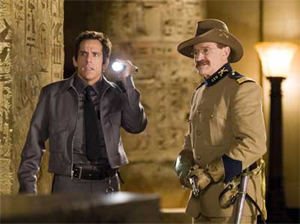 Paul Fischer: Now you were saying at a press conference for this, when you were being asked about the possibility of doing another Pink Panther, you kind of implied, that doing another Panther film, no matter whatever one thought of the first one, could in fact some way be a step backwards because then it would be a sequel, it will be different and it would not be the same as what youve just accomplished. Is that a reasonable assumption to make?
Paul Fischer: Now you were saying at a press conference for this, when you were being asked about the possibility of doing another Pink Panther, you kind of implied, that doing another Panther film, no matter whatever one thought of the first one, could in fact some way be a step backwards because then it would be a sequel, it will be different and it would not be the same as what youve just accomplished. Is that a reasonable assumption to make?Shawn Levy: Its a reasonable assumption to make.
Paul Fischer: Steve has been saying that he wanted to do another one.
Shawn Levy: Look, weve been developing a script. We havent yet quite gotten there, and if the moment comes where the right script comes to light Ill have a decision to make. But it is honest and true for me to say that I am hungry to tell new stories. I am hungry to make different types of films.
Paul Fischer: And youve learnt this new art form...
Shawn Levy: Well, look, making a movie on this scale, working with a new stable of talent, new actors, new technologies, filmmaking with this broad a canvas is addictive. You can tell in some ways a bigger story and you can make a movie that is more than just funny. Now obviously I value a kick-ass funny film. I love Borat and Wedding Crashers and Pink Panther for that matter as much as anything else, but my appetite has been wetted for broader scope, for filmmaking with a broader bandwidth. And Ill be reluctant to not keep evolving.
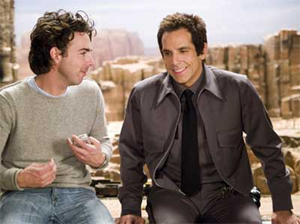 Paul Fischer: What do you learn when you work with iconic comic actors like Steve and Ben? I mean Im sure they both have very different ways of working, but I mean...
Paul Fischer: What do you learn when you work with iconic comic actors like Steve and Ben? I mean Im sure they both have very different ways of working, but I mean... Shawn Levy: The comparison between Steve and Ben is not as dramatic a divide as you might expect in that they are both probably smarter than most everyone we know. Theyre like not just ooh, artistic smart but just smart, smart, thoughtful smart, probingly smart. And they both are tireless in the quest for the perfect line, the perfect gag. Theyll both call me or email me at 4 in the freakin morning if thats when they come up with a new idea. Theyll both rewrite a scene thirty times to make sure that every punctuation mark feels honest and funny and best possible. The quest for the best possible informs both of their work, and while it may be disappointing to some to find them less than hilarious in real life theyre both incredibly admirable guys because few people elevate work ethic and perfectionism to this level. And its definitely affected me. Its definitely inspired me. And on this movie in particular its changed me as a filmmaker.
Paul Fischer: Is there somebody, a comedian or a comic actor, that you have sort of a burning desire to work with?
Shawn Levy: Vince Vaughn and Will Smith.
Paul Fischer: Oh, you consider Will Smith a comic actor?
Shawn Levy: I consider both Vince Vaughn and Will Smith great actors who do really good comedy.
Paul Fischer: What do you hope to be doing next? I mean are you looking for stuff? Are you going to take a well-deserved break now?
Shawn Levy: No, my break will be a month long and I will fill my one month off by traveling around the world promoting Night at the Museum. But thats a stride for me.
Paul Fischer: Where are you going?
Shawn Levy: Ah, Ill be in London, Frankfurt, Rome and New York - possibly later in Japan and Australia. But I am reading a lot of scripts, and ironically since the day the trailer for this movie appeared on Pirates of the Caribbean the range of screenplays and volume of screenplays that are being sent to me has increased by at least double. The movie has opened up certain opportunities that did not exist before Museum and Im grateful for every one of them.
MORE
- Viggo Mortensen The Road
- 24 Cast Reunion
- Aaron Eckhardt No Reservations
- Aaron Eckhart The Dark Knight
- Adam McKay Step Brothers Interview
- Alan Alda Diminished Capacity Interview
- Alan Alda Diminished Capacity Interview
- Alex Dimitriades
- Al Pacino Oceans 13
- Alan Rickman Snow Cake
- Alan Rickman Sweeney Todd



